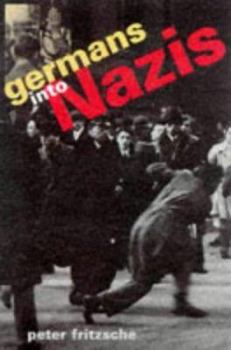Germans Into Nazis
Select Format
Select Condition 
Book Overview
This work organized around turning points in 1914, 1918 and 1933 explains why the Nazis were so popular and what was behind the political choice made by the German people. Rejecting the ideas that the Germans voted for Hitler because of their hatred for the Jews or humiliation of losing World War I, or had been ruined by the Great Depression, the author argues that Nazism was part of a larger process of democratization and political invigoration that began with the outbreak of war in 1914.
Format:Hardcover
Language:English
ISBN:067435091X
ISBN13:9780674350915
Release Date:March 1998
Publisher:Harvard University Press
Length:269 Pages
Weight:1.01 lbs.
Dimensions:0.9" x 5.8" x 8.5"
Customer Reviews
3 ratings
fascinating review of early 20th century Germany
Published by Thriftbooks.com User , 14 years ago
this was a hard book to put down; for a history buff and self-described Germany "expert" especially, it is a must-read. Germans into Nazis provides valuable insight into the mindset of the average German in the early years of the past century. Historically speaking, the author reminds the reader of contemporary mindsets of different groups of Germans at various timelines. For example, during the first year of war in 1914 Kaethe Kollwitz, a prominent sculptor/artist/socialist, through her diary related the sudden feeling of "a sense of duty and responsibility to the Fatherland" as her son served, and was soon killed, later that year. She herself was astonished at her own high-minded sentiments. Another narrative of the exhortation to housewives to save food scraps..."everything from bones to fruit pits" Only in meticulous, record-keeping Germany would even a small city such as Barmen (now part of Wuppertal) register the PRECISE amount of cherry and plum pits (7,815 kilograms, over eight tons!) collected for crushing into cooking oil DURING 1915-1916. No doubt the reader can only imagine if the cherry pits had been collected separately from the plum pits there would have been separate statistics for each fruit pit! Flash forward to 1933-1945 and one can better understand the Nazis to carry on with the recording of detailed minutia in neat orderly ledger books regardless of what horrors might be involved in being duly recorded. Many times the book also surveys the political landscape of Germany in the Weimar Republic years, and many readers will be surprised to learn that often many more Germans protested AGAINST war than agitated for, or attended pro-war rallies. The well-covered, near-civil war atmosphere and the left-right schism of the 1918-1920 period is especially enlightening. Many statistics and excellent footnotes expound on and allow further research for the true academic student of Germanic history. At a mere 269 pages you will wish you could have more!
The Nazi Appeal
Published by Thriftbooks.com User , 15 years ago
For over 60 years,people have been debating the appeal of the Nazi Party to the German nation.Did anger over the treaty of Versailles make Germans support Hitler? Was it the effects of the Great Depression? Was it because Germans had little exposure to democracy that they turned to fascism? Was it the Nazi racial views that attracted Germans to Hitler? Is there one answer, probably not? Can one answer possibly explain such a complex situation as to why Germany turned to the Nazis? In Germans into Nazis historian Peter Fritzsche has a provocative thesis.He argues that the appeal of the Nazis was rooted in a strident nationalism that was born in 1914 during the lead up into the Great War.Fritzche asserts that the Kaisers call for a true unity of Germans during the war (BURGFRIENDEN) may have been cynical on Wilhelms behalf, but that was not the way many Germans saw it.They saw it as "shot across the bow" of special interests and an opportunity to create a new Germany without as many class barriers. The collective experience of total war united many Germans as never before.The hardships of modern conflict(loss of loved ones, the turnip winter,etc) welded many Germans into the Volksgemeinshaft.(the peoples community)When the war ended many Germans looked forward to the republic as a way to fulfill their hopes for a new direction in national life. Fritzsche maintains that various political parties such as the communists, socialists and various parties on the right did not understand the language of the German masses when it came to national needs.But the Nazis did. They comprehended the energy that was unleashed during the Great War. and they tapped into it.They rejected old political solutions and suggested new ideas.According to Fritzche "They challenged the authoritarian legacy of the empire, rejected the class- based vision of Social Democrats and Communists, and both honored the solidarity and upheld the chauvinism of the nation at war."This book does not deal with Hitler or anti- semitism, but how Germans across the political spectrum were attracted to the Nazis. It seems that no one reason can explain the rise of the Nazis, but this book is a needed volume in attempting to understand this important topic.
Go along to get along
Published by Thriftbooks.com User , 17 years ago
For years I searched for the answer as to why Germany turned her back on the civilized world. I discovered that individual people did it one by one in an attempt to get along, an answer that was much simplier than I had ever suspected. Most people found things they could support the Nazis for doing and many things they disageed with and thats even more true of the German military leaders who benefited from the resurgence of military spending, promotions, greater status, etc. After the death of von Hindenberg no one had the power to remove the madman Hitler from power.





